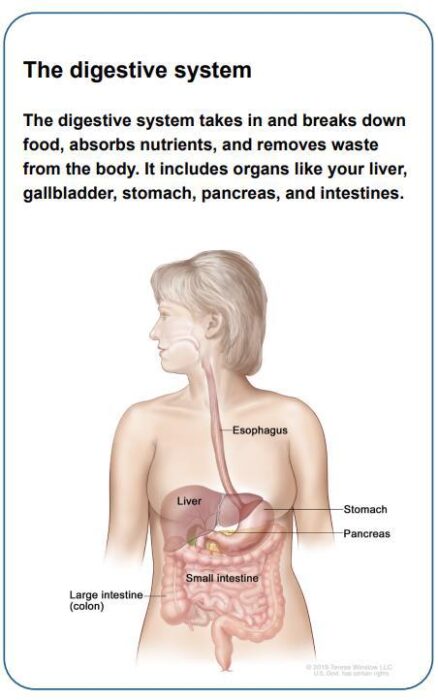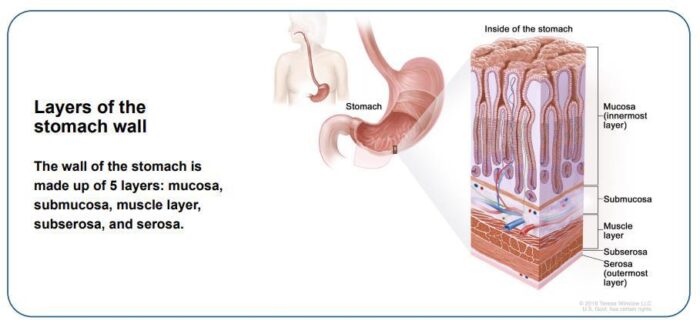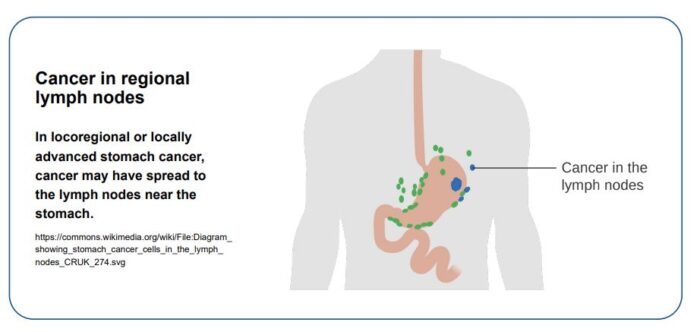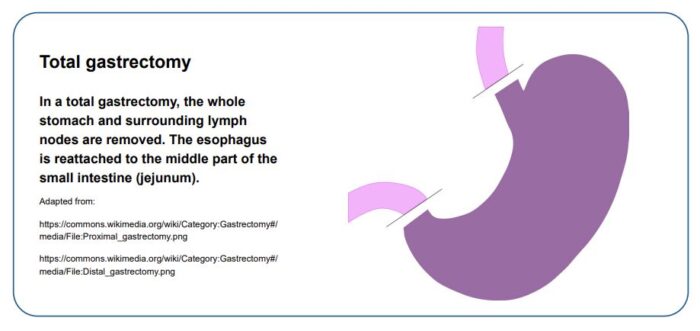Table of Contents
Overview : Gastric Cancer Treatment
Gastric cancer, also known as stomach cancer, is a malignancy that develops in the lining of the stomach. It is a serious and potentially life-threatening condition if not diagnosed and treated early.



Causes and Risk Factors
Helicobacter pylori Infection
Infection with Helicobacter pylori, a type of bacteria that can infect the stomach lining and cause inflammation, is a significant risk factor for gastric cancer.
Dietary Factors
A diet high in salted, smoked, or pickled foods, as well as low intake of fruits and vegetables, may increase the risk of gastric cancer
Tobacco and Alcohol Use
Smoking tobacco and heavy alcohol consumption are associated with an increased risk of gastric cancer
Family History and Genetics
Individuals with a family history of gastric cancer or certain genetic conditions, such as hereditary diffuse gastric cancer syndrome, have a higher risk of developing the disease.
Types of Gastric Cancers
Adenocarcinoma
Adenocarcinoma is the most common type of gastric cancer, accounting for the majority of cases. It typically develops in the glandular cells lining the stomach.
Lymphoma
Gastric lymphoma is a type of cancer that develops in the lymphatic tissue of the stomach. It is less common than adenocarcinoma but can still occur.
Gastrointestinal Stromal Tumors (GISTs)
GISTs are rare tumors that develop in the gastrointestinal tract, including the stomach. They can be cancerous or noncancerous.
Symptoms
Early Symptoms
- Indigestion or heartburn
- Loss of appetite
- Feeling full after eating small amounts
- Nausea and vomiting
Advanced Symptoms
- Unintended weight loss
- Abdominal pain or discomfort
- Blood in the stool
- Fatigue and weakness
Diagnosis : Gastric Cancer Diagnosis in Hyderabad
Endoscopy
Endoscopy is a common procedure used to diagnose gastric cancer. During endoscopy, a thin, flexible tube with a camera is inserted through the mouth and into the stomach to examine the lining for abnormalities.
Biopsy
If suspicious lesions or tumors are identified during endoscopy, a biopsy may be performed to obtain tissue samples for further examination under a microscope.
Imaging Tests
Imaging tests such as computed tomography (CT) scans, magnetic resonance imaging (MRI), and positron emission tomography (PET) scans may be used to determine the extent of the cancer and whether it has spread to other parts of the body.
Treatments : Gastric Cancer Treatment in hyderabad
Surgery
Surgery is the primary treatment for gastric cancer and may involve:
Partial Gastrectomy
Removal of part of the stomach containing the tumor.
Total Gastrectomy
Removal of the entire stomach.





Chemotherapy and Radiation Therapy
Chemotherapy and radiation therapy may be used before or after surgery to shrink tumors, kill remaining cancer cells, or alleviate symptoms in advanced cases.
Advantages of Robotic and Laparoscopic Surgery
Minimally Invasive Techniques
Robotic and laparoscopic surgeries offer several advantages over traditional open surgery, including:
Smaller Incisions
Minimally invasive techniques involve smaller incisions, leading to less postoperative pain, reduced risk of infection, and faster recovery.
Enhanced Visualization
Robotic systems provide surgeons with high-definition 3D
visualization and magnification, allowing for greater precision and accuracy during surgery.
Reduced Blood Loss and Complications
Minimally invasive techniques are associated with lower rates of blood loss, shorter hospital stays, and fewer complications compared to traditional open surgery.
Prevention and Diet
Healthy Lifestyle Choices
Adopting a healthy lifestyle can help reduce the risk of gastric cancer. This includes:
Gastric Cancer Treatment In Hyderabad
Gastric cancer is a serious condition that requires immediate medical attention and expert care. Dr.Pavan Kumar Jonnada, one of the best surgical oncologists in Hyderabad, is renowned for offering comprehensive treatment and exceptional care to people dealing with gastric cancer.
Gastric cancer, also known as stomach cancer, can be effectively treated when detected in its early stages. It can also occur without showing any noticeable symptoms, which underscores the importance of regular screenings and check-ups. To ensure a proper diagnosis, timely medical consultation and thorough screening are essential. We are here to help you with the best gastric treatment in Hyderabad under the guidance of experienced oncologists and surgeons to provide personalised treatment plans.
We understand that gastric cancer diagnosis can be challenging, which is why we are providing advanced treatment options such as robotic gastric cancer surgery in Hyderabad. Along with this, Dr. Jonnada is considered to be one of the best surgical oncologists in Hyderabad.
Are you and your loved one going through gastric cancer? Know that you are not alone. Consulting with Dr. Pavan Kumar Jonnada for the best gastric cancer treatment in Hyderabad is a decision you can trust. He is the best surgical oncologist in Hyderabad and can help you navigate through your gastric cancer diagnosis and treatment journey with expertise and compassion.
Dr. Jonnada offers robotic cancer surgery in Hyderabad, providing patients with advanced and minimally invasive treatment options for gastric cancer. Robotic cancer surgery in Hyderabad by Dr. Pavan Kumar Jonnada can help you achieve better outcomes and a faster recovery period. This advanced treatment option offers various advantages to patients with gastric cancer, such as minimal incisions, fewer postoperative risks, and reduced pain.
Contact us today to schedule your consultation with Dr. Pavan Kumar Jonnada, the best surgical oncologist in Hyderabad, and get the expert guidance and support you need for the best gastric cancer treatment.
Consult for Gastric Cancer Treatment & Surgery in Hyderabad

Schedule Your Appointment Online Now!
available at
Cancer Clinic
Vansh Clinics & Diagnostics,
212, Kokapet Terminal, Gandipet Road,
Kokapet, Hyderabad
Medicover Cancer Institute
Hitech City, Hyderabad

